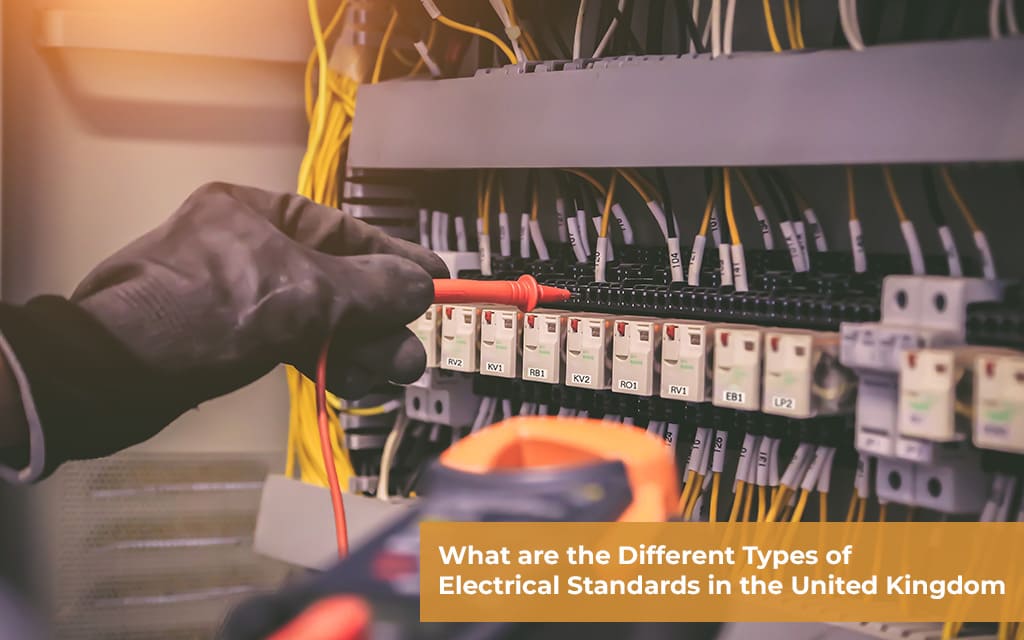Did you know that electrical hazards are one of the major contributors for a shocking number of workplace injuries and fatalities in the UK? (Source: Statista 2022)
Faulty sockets and substandard electrical equipment result in more than 350K casualties and approximately 70 deaths every year. (Source: RHA 2022)
To help prevent these incidents and promote electrical safety, the UK has established a comprehensive system of electrical standards that cover everything from the design and installation of electrical systems to the safety of appliances and equipment.
Keep reading to explore different types of electrical standards in the UK, why compliance with these standards is so critical for ensuring electrical safety and penalities for non compliance.
But, before that, must understand…
Why Electrical Safety Standards UK are Important? & Who makes them?
Here are the reasons Why electrical safety standards UK are important and critical.
#Ensuring Safety and Reducing Hazards
- Preventing Electrical Accidents and Injuries
Electrical standards help prevent accidents caused by contact with live parts, electrical burns, and faults that could lead to fires or explosions.
- Reducing the Risk of Fire and Explosions
Standards for wiring, installation, and appliances help ensure that electrical equipment is designed and installed to reduce the risk of fire and explosions.
- Protecting Individuals and Property from Damage
By following electrical standards, individuals and property are protected from the damage and harm caused by electrical accidents and failures.
#Promoting Efficient and Sustainable Energy Practices
- Encouraging the Use of Energy-Efficient Technologies
Electrical standards promote the use of energy-efficient technologies, which help reduce energy consumption and greenhouse gas emissions.
- Promoting Renewable Energy Sources
Standards also encourage the use of renewable energy sources, such as wind, solar power so as to reduce dependence on fossil fuels.
- Reducing Energy Waste and Promoting Sustainable Energy Use
Standards help promote sustainable energy use and reduce energy waste by establishing guidelines for energy-efficient lighting, heating, and cooling systems.
#Ensuring Compliance with Legal Requirements
- Meeting Health and Safety Standards
Electrical standards help ensure that electrical installations and appliances meet legal health and safety requirements to protect individuals and property.
- Adhering to Building Regulations and Codes
Electrical standards ensure compliance with building regulations and codes to ensure safe and reliable electrical installations.
- Avoiding Legal Penalties and Fines
By following electrical standards, individuals and businesses can avoid legal penalties and fines for non-compliance.
#Supporting Quality and Reliability of Electrical Installations
- Improving Electrical Installation Quality
Electrical standards improve the quality of electrical installations by providing guidelines for design, installation, and testing.
- Ensuring Reliable Performance
Electrical standards help ensure the reliable performance of electrical equipment and systems, reducing downtime and repair costs.

Understanding the Electrical Safety Standards UK: Protecting Lives and Property
By complying with these electrical safety standards in the UK, we can help to ensure that our homes, businesses, and public spaces are safe for everyone.
The list is not exhaustive but covers the most common ones.
| BS Electrical Standards |
Category/Type |
Description |
Why It is important? |
| BS 7671 |
IET Wiring Regulations |
BS 7671 is the UK national electrical standard for designing, installation, and maintenance of electrical installations in buildings.
It covers aspects such as electrical safety, earthing, bonding, and protection against overcurrent and overvoltage. |
Ensures that electrical installations in buildings are safe to use and operate, reducing the risk of electrical hazards such as electric shock, fire, protection against overcurrent and over voltage. |
| BS 5839 |
Fire Detection and Alarm Systems |
BS 5839 outlines the requirements for fire detection and fire alarm systems in buildings.
The standard covers aspects such as the types of detectors and alarms, the positioning of detectors and alarms, and the wiring of the system. |
Ensures that fire detection and alarm systems are installed and maintained correctly, reducing the risk of fire-related incidents. |
| BS 7909 |
Temporary Electrical Systems |
BS 7909 provides guidelines for the design, installation, and operation of temporary electrical systems used for entertainment purposes. The standard covers aspects such as electrical safety, earthing, bonding, and protection against overcurrent and overvoltage. |
Ensures that temporary electrical systems used for events such as concerts and festivals are installed and operated safely. |
BS 1362 &
BS 1363 |
Plugs, Socket-Outlets, fuses and Adaptors |
BS 1363 sets out the requirements for 13A plugs, socket-outlets, adaptors, and connection units used in the UK.
The standard covers aspects such as plug and socket dimensions, earth continuity, insulation resistance, and durability. |
Ensures that electrical equipment is compatible with the UK electrical system and is safe to use |
| BS EN 60335 |
Electrical Appliances |
BS EN 60335 covers the safety requirements for household and similar electrical appliances. The standard covers aspects such as electrical safety, mechanical safety, and thermal safety. |
Ensures that household electrical appliances are safe to use and do not pose a risk to users. |
| BS 6500 |
Electric Cables |
BS 6500 covers the requirements for electric cables used in the UK.
The standard covers aspects such as cable sizing, conductor materials, insulation materials, and sheathing materials. |
Ensures that electric cables are suitable for their intended use and are safe to use |
| BS EN 62305 |
Lightning Protection |
BS EN 62305 provides guidelines for the protection of structures and systems against lightning.
The standard covers aspects such as lightning risk assessment, lightning protection system design, and installation and maintenance requirements. |
Ensures that structures and systems are protected against the damaging effects of lightning strikes. |
Responsibility for Electrical Safety in the UK
The responsibility for maintaining electrical safety is shared between several parties:
- the owner or landlord of a property,
- the electrical engineer or contractor responsible for installation or repair work,
- the government regulatory bodies responsible for enforcing safety standards.
All of these parties have a crucial role to play in ensuring that electrical systems and appliances are safe and properly maintained.
Let’s discuss their responsibilities in detail.
Responsibility of owner/ landlord
- Using standard and energy efficient appliances and not running after counterfeit electrical products.
- Conducting regular inspections and maintenance of all electrical equipment and installations.
- Ensuring that people working on or with electrical equipment or systems are ‘competent’ for the task i.e. having suitable training, skill, and knowledge to prevent injury to themselves and others.
- Any equipment suspected of being faulty should be removed from use immediately and should be labelled ‘DO NOT USE’.
- Always switch off tools and power socket outlets, wherever possible, before plugging in or unplugging them.
- Before cleaning or making adjustments, equipment should be switched off and/or unplugged to prevent accidents.
Responsibility of electrical engineer or installation contractor responsible for installation or repair work
- Ensuring the electrical installation or repair work is safe.
- Checking and testing electrical systems and equipment properly and diligently.
- Checking for grounding of wires.
- Checking for loose cables and socket overload.
- Reducing the voltage if needed.
- Ensuring people working on or with the electrical equipment or systems are competent for the task.
- Regularly training the employees or people concerned with it.
Responsibility of the government regulatory bodies
- Develop and implement safety regulations for electrical installations and equipment.
- Conduct inspections to ensure compliance with safety standards and regulations.
- Investigate accidents and incidents related to electrical safety and take appropriate enforcement action when necessary.
- Provide guidance and training to businesses, organizations, and individuals on electrical safety practices and standards.
- Collaborate with other regulatory bodies and stakeholders to improve electrical safety practices and standards.
- Review and update safety regulations and standards as needed to ensure they are effective and up-to-date.
Penalties for Violating Electrical Safety Standards UK
The penalties for violating electrical standards in the UK can vary depending on the severity of the violation and the level of risk involved.
- Homeowners who fail to comply with electrical safety standards may face fines of up to £5,000 per offense and/or imprisonment for up to six months.
- Contractors or electrical engineers who violate electrical safety standards may face legal charges, fines, and/or imprisonment. It depends on the nature and severity of the violation.
- Government officials who fail to enforce electrical safety standards may face legal action, fines, and/or disciplinary action.
It’s important to note that the penalties for electrical safety violations are intended to serve as a deterrent to prevent future violations and to protect the public from the risks associated with unsafe electrical installations.
What is the British standard for security systems?
Bottom Line
By following the electrical standards in the UK, you can ensure the safety of your property and those who use it.
Whether you are undergoing a new home build or renovating your property, hiring a competent contractor such as TEL Constructions who follows the standards can make all the difference.
Don’t compromise on safety, trust the EXPERTS!
 19 December 2025
19 December 2025 19 December 2025
19 December 2025 19 December 2025
19 December 2025 19 December 2025
19 December 2025 19 December 2025
19 December 2025




mangat